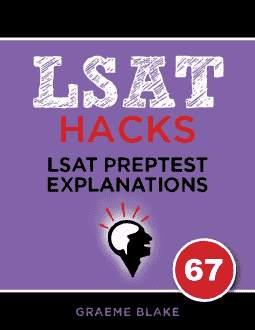QUESTION TEXT: Even though MacArthur's diet book helped many people…
QUESTION TYPE: Principle
CONCLUSION: MacArthur should not have published his book.
REASONING: MacArthur’s diet would damage people’s health, since it doesn’t include many fruits and vegetables. MacArthur knew this, or ought to have.
ANALYSIS: With principle-justify questions, you have to find a moral principle that shows the actions in question were wrong. The conclusion is very specific. Publishing the book was wrong.
You can’t assume any moral principles on the LSAT. Maybe, for example, it’s always ok to publish books. Or maybe it’s ok to damage people’s health if you help them lose weight.
Many of the wrong answers tell us when we should publish, or they talk about what people following a diet should do.
That’s irrelevant. We want to prove that McArthur should not publish his book.
___________
- This goes too far. We don’t know that MacArthur’s diet would seriously damage anyone’s health. As Yifei mentions in the comments below, this answer also should have said “known or should have known” in order to parallel the stimulus.
- This tells us whether to follow a diet. The argument was whether you should publish a book.
- This tells us when to publish. We need a rule telling us when not to publish.
- This is the wrong issue. MacArthur knew that his book would help people meet their goal of weight loss. The question is: is it ok to help people lose weight if it hurts their health?
- CORRECT. MacArthur ought to have known that his advice would harm people’s health. According to this, he shouldn’t have published.


Hi there,
So I read the explanation for why E and Yifei’s question on why not A and I find myself still tripped up about the “principles” part of the question.
I picked E because it sounded like it would most “justify” the argument’s reasoning but I spent a long time staring between A and E because I was thinking that if it was a “principles” question then it should be a lot more vague/general/broad. For a long time, I kept thinking that maybe E was too specific and wouldn’t satisfy a principles question because it’s supposed to be more vague like A.
Can you explain more in detail what the question is asking for and how that relates to why E is correct over A?
There’s actually no need for a principle to be vague. A principle that clearly relates to the situation at hand is actually best. Principles are *general* but that doesn’t mean vague. i.e. if I say “If there is a baseball game in town, you should always go” I’m speaking generally about baseball, but the principle is quite clear.
Note: This is an old comment but I wanted to clarify the point.
A is incorrect because it says “if one knows that”. The stimulus says “either know or should have known”. So A cannot justify the argument perfectly.
Yes, thanks for your comment! That analysis of why (A) is incorrect is also accurate.